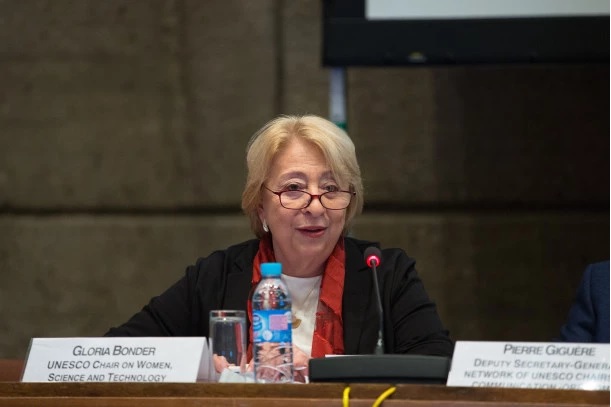Gloria Bonder is the Director of the Department of Gender, Society and Policies of Facultad Latinoamericana de Ciencias Sociales (FLACSO) in Argentina. She is also the UNESCO Chair in Women, Science and Technology in Latin America, and the Coordinator of the UNESCO Chairs on Gender. Ms Bonder was distinguished by UNESCO as one of the 60 women worldwide who has helped accomplish the organization’s goals, representing the voices, aspirations, and visions of many women around the world.
On the International Day of Girls and Women in Science, why is it important that we push for girls’ participation in science, technology, engineering and mathematics – typically known as STEM fields?
STEM plays a central and growing role in the economic and social development of all countries. It is essential to question the gender biases and stereotypes in the educational, cultural and family spheres that influence girls’ career choices.
Although in recent decades these stereotypes have become less prevalent, women who pursue STEM face explicit or subtle discrimination. This can lead to women holding secondary roles in educational or work environments, receiving less recognition or appreciation of their contributions, or other results.
It is not a matter of “adding” women to science and technology, but of ensuring that all people – regardless of their gender, wealth, ethnicity or other factors – can study and work in STEM environments free from all forms of discrimination.
Girls are significantly less likely to pursue science-related studies than their male peers, even though they are doing at least as well as boys in mathematics and science in the majority of countries. What’s holding them back?
We need to rethink the indicators we use to analyze girls’ interest in these fields. The UNESCO Chair in Women, Science and Technology in Latin America has conducted several studies that have shown that there is no direct relationship between academic achievement in these subjects and career choices. Other factors, such as having a close relative in a science field, a teacher who encourages interest in these disciplines, or support from families can influence girls’ career choices.
We must also address the belief that there are skills “naturally” attributed to men such as rationality, logical and abstract thinking, ambition, competitiveness, among others. While this belief is less prevalent than in the past, it still limits women’s uptake of STEM fields. We need to take a critical look at institutional cultures in schools and in the workplace.
In your role as UNESCO Regional Chair on Women, Science and Technology in Latin America, what have you been doing to get more girls in STEM?
We have been undertaking research, delivering training programmes, providing advice and expanding access to mentorships. We are particularly interested in connecting knowledge production with training and policy development advice.
Let me tell you about two initiatives:
We coordinated the Central American edition of the TeachHer Project, created by UNESCO, and trained over 200 teachers to focus on gender equality in the delivery of STEM, including arts, education programmes. The initiative had a spin-off effect, prompting the development of similar courses in other institutions.
In our ACT (Act on Gender) and Inspire programmes, we have created a community of practice made up of universities and research centers from different Latin American countries. This is supporting policies and plans for gender equality in universities and scientific research centres, and broad institutional change.
We also conducted large scale communication and awareness campaigns aimed at overcoming gender inequalities in science and technology.
What motivates you to do the work that you both as the UNESCO Chair and as the Director of the Gender, Society and Policies Department of FLACSO in Argentina? What keeps you going?
Since I was young, I noticed gender inequalities in my country, region, and the world. I wanted to understand their causes, the consequences, and be part of overcoming then now and in the future.
My commitment to research, education and the creation of institutions and policies that guarantee equal rights and opportunities for all social sectors has grown, nourished by the advancement of gender studies in the region’s universities and the progressive integration of gender equality in regional and international agendas.
New efforts like UNESCO’s Futures of education initiative challenge me to continue this process, setting new goals and strategies to promote a structural transformation of education, especially science and technology education.
What advice do you have for younger generations of girls and women trying to pursue STEM?
I have three pieces of advice:
First, know and exercise your rights! Detect and reject all forms of discrimination, harassment and violence which often occur in STEM educational and research institutions and the workplace.
Second, build your networks to exchange experiences, build collaborative projects and proposals for the implementation of gender equality policies in your educational and work environments.
Finally, be part of change. Advocate for scientific and technological development that contributes to the betterment of societies.




